Booth (played by Jeff Fahey, who’s glad to be working again) recruits Machete to supposedly assassinate Senator John McLaughlin. He anticipates that Machete, a scarred Mexican day laborer with a reputation for brutality, might wonder why a rich guy with a bad mullet wants a Senator dead. Booth explains: illegal labor benefits both sides of the border. Texas gets cheap construction crews, restaurant staff and maintenance workers; Mexico gets American dollars flooding into their poor towns.
“This state runs on illegal labor,” Booth tells Machete. “Thrives on it. Keeps costs down. Keeps the wheels turning.”
Booth is the invisible hand of Adam Smith made manifest. Smith’s assertion was that, if an outcome is truly beneficial to all parties involved, the market will find a way to make it happen. Booth and his assassination plot are the way.
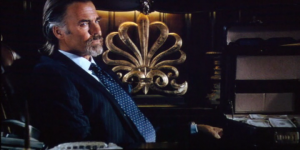
Let my invisible hands walk all over you ...
Of course, as the trailer reveals, Booth is setting Machete up. Cue gunfights, knife fights and chase scenes. Does this mean that Booth’s reasoning about the mutual benefit to Mexico and Texas was wrong?
Not necessarily. While Booth’s argument to Machete might be true, he makes it in bad faith. He doesn’t care about improving economic conditions in both Texas and Mexico. He really cares about keeping Texas wealthy. He’ll do that by constructing a fence with known weak points. Doing this will keep the nationalists happy (getting McLaughlin re-elected) and will keep Booth happy (streaming cheap labor into Texas). It’ll be a labor supply which he controls.
“An open border allows supply to flow in too easily,” Booth tells the Padre (while crucifying him). “Drives our prices down. A secure border limits supply; drives the prices up. Higher prices, higher profits.”
This is another point that Smith made: that self-interest is a more reliable predictor of behavior than brotherly good feeling. “It is not from the benevolence of the butcher, the brewer, or the baker, that we expect our dinner, but from their regard to their own self-interest.” Machete should probably have started suspecting Booth once Booth started talking about “the good of both our people.”
However, Adam Smith wouldn’t have much more to say about the economics of Booth’s real plan. Nor would a lot of economists. Economic theory has a lot to say about how production costs, competition and limited information can affect the distribution of goods.
Booth is engaged in what economist Anne Krueger would call rent-seeking: taking advantage of limited information or limited opportunity in the marketplace to capture a guaranteed stream of revenue. A fleet of taxis can increase their profits by raising prices, putting more cars on the street or reducing their costs. They can also raise prices by lobbying for a limited supply of taxi licenses. The latter is an example of rent-seeking.
Rent-seeking prevents the just and efficient allocation of goods as envisioned by Adam Smith. If it’s cheaper for a factory owner to get a law passed banning a rival’s products than to compete with the product, then a rational factory owner would host fundraisers rather than build new products. From the viewpoint of classical economics, rent-seeking is bad. It means wealth is being wasted in the creation of an unfair environment, rather than allocated from producers to consumers in the quest to make better goods at lower prices. The millions of dollars that GM spent lobbying Congress to raise import tariffs could have been used to design better cars.
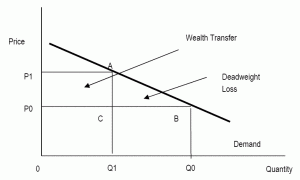
MATH, ergo it's right.
Rent-seeking is one of many groundbreaking phenomena uncovered by public choice theory. Founded by Gordon Tullock and James Buchanan with the 1962 book The Calculus of Consent, public choice theory applies economic theories of behavior to the practice of lawmaking. Traditional economics assumes that laws are part of the background of a market, like the weather or the terrain. Public choice theory presumes that laws are made by the same rational, utility-maximizing creatures that are part of the market those laws govern.
In public choice theory, law is a product, just like bread or cars.
(For the non-economists: “rational utility maximizer” is jargon for “someone who can be counted on to act in what they think is their best interest”)
Booth’s actions make the most sense when viewed through the lens of public choice theory. He wants to capture revenue that’s flowing across the border when illegal day laborers cross over from Mexico. He can do this by building up his own supply of cheap labor – a capital expenditure that will take time to recoup its costs. Or he can do this by creating a legal environment that chokes off, but doesn’t stop, the supply of Mexican labor. If getting McLaughlin re-elected is cheaper, and Booth is a rational utility maximizer, then he’ll go through with his plan.
After my last post on how much an inception costs – and the tide of very polite corrections that followed in the comments thread – I’m not going to take a stab at the financials. But Booth only needs to float $150,000 to get Machete to do the job, plus some hazard pay for his cronies. That seems like an obvious win.
Of course, Booth’s plan doesn’t work unless Texas is already in a state of anarchy. Booth needs the Network: a source of Mexican scapegoats, one of whom he can entice into making a martyr out of the Senator. He also needs the Vigilantes: a volunteer militia who’ll patrol the border and keep the supply of labor tight. Rent-seeking normally hinges on the existence of a government which can pass favorable laws to help special interests. Texas doesn’t have a government in the Weberian sense: there is no agency with a legitimate monopoly on the use of force. Rather, there are several competing agencies.
This doesn’t bother Booth. It just means he needs to make a few more phone calls.
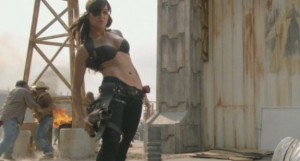
There's a terrible joke about demand curves here. You make it; I'm tired.
Machete, to reiterate an earlier point, is not a story about competing schools of anarchist thought. It’s a story about how anarchism doesn’t free us from rent-seeking. Just because you abolish the state doesn’t mean you abolish opportunities for power. Orwell depicted this in Animal Farm, where the masterless farm gradually reverts to its old ways under the influence of the pig Napoleon. Le Guin depicted this in The Dispossessed, where a utopian anarchist commune in the future is still plagued by cliques, petty bureaucracy and famine. This was also one of Robert Nozick’s chief criticisms of anarchism in his book Anarchy, State and Utopia. The anarcho-capitalist vision of private protection agencies could not last forever; one agency must inevitably become potent enough that it becomes a de facto state.
Booth’s plans fail in the end and the Vigilantes are scattered in a pitched battle. This leaves the Network as the only agency with a monopoly on force in the state of Texas. Does this mean they’re a new state? Will someone find an opportunity to gain easy profits by rent-seeking with the Network – exploiting Mexican nationalism to stage a boycott on competitors, perhaps?
We’ll find out in the sequel.
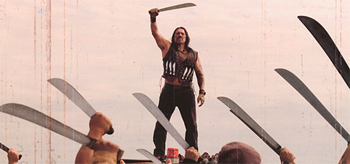
MACHETE 2: Pareto Brutality!
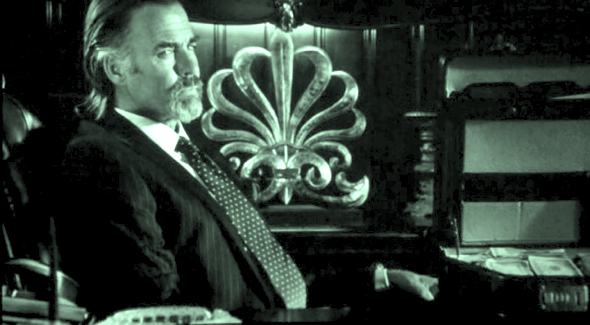
One Comment on “Macheteconomics”